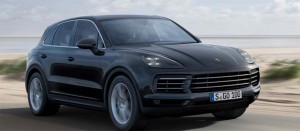
The third-generation 2018 Porsche Cayenne will be getting a diesel engine after all ... in Europe only.
Not so fast.
Not words usually applied to Porsche, but in the case of the company’s recent proclamation that it was getting out of the diesel business, the phrase fits as one of Porsche’s senior executives walked back the idea.
Apparently, the company plans to launch a new Cayenne this year with a diesel and the Macan getting one is still a possibility.
“We’re not saying that we are exiting (diesel),” Detlev von Platen, Porsche’s head of sales and marketing, told Automotive News Europe. “For SUV models, it makes sense where customers want range and torque.”
(Porsche shifting from diesel to electric. Click Here for that story.)
For the U.S. market, the point is moot: we’re not getting one for either vehicle regardless if they are offered in the future, according to Porsche officials. However, it’s clear the matter isn’t settled in the halls of Porsche’s Stuttgart, Germany headquarters.
The announced comes as a German court confirmed the power of cities to ban older diesel models seeking to cut pollution levels. Dusseldorf and, ironically, Stuttgart sought to ensure the bans were enforceable after the German federal government came out against the moves.
(Click Here for more about the German court upholding a diesel ban in two cities.)
Officials feared the bans would hurt automakers as well as cause the value of the affected vehicles to drop. Several cities have discussed implementing full-time bans, like those in Germany, and it’s expected the ruling may embolden more cities within Germany to do the same.
However, the impact is likely to be blunted by the fact that most of the newer diesel-powered vehicles will not be part of the ban. Critics of the ban fear it could place a sudden strain on the mass transit systems in the two cities while also impacting the value of as many as 12 million diesel vehicles now in operation in Europe’s largest automotive market.
(For more on FCA’s reported diesel phase-down, Click Here.)
Proponents have been hoping for a favorable court ruling, however, seeing it as a way to get some of the country’s dirtiest vehicles off the road. They also see the decision by the court in Leipzig as supporting broader efforts to phase out diesel technology across Europe.
